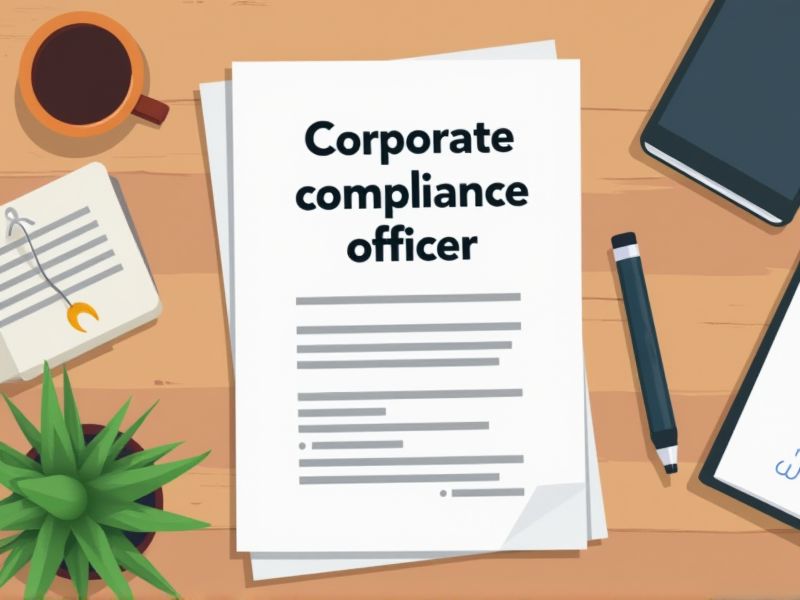
Corporate compliance officers are pivotal in ensuring organizations adhere to legal standards and ethical norms. Certifications provide these professionals with specialized knowledge and skills to navigate complex regulatory frameworks effectively. As regulations evolve, these credentials help maintain up-to-date competence and credibility. Explore essential certifications crucial for a Corporate compliance officer.
Certified Compliance & Ethics Professional (CCEP)
Certified Compliance & Ethics Professional (CCEP) enhances a corporate compliance officer's ability to effectively manage and mitigate legal risks within the organization. CCEP certification equips professionals with up-to-date knowledge of regulatory requirements, which is critical in maintaining adherence to evolving laws. Corporations value CCEP-certified individuals for their expertise in designing and implementing effective compliance programs that support ethical corporate behavior. Certification also signals to stakeholders a strong commitment to maintaining high standards of corporate governance and ethical practices.
Certified Regulatory Compliance Manager (CRCM)
A Certified Regulatory Compliance Manager (CRCM) provides a structured understanding of complex regulations, ensuring the corporate compliance officer remains up-to-date with current laws. The designation equips the officer with critical skills to identify and mitigate compliance risks effectively, safeguarding the organization from legal issues. With a CRCM, the officer gains credibility and trust, which reinforces stakeholder confidence in the company's compliance programs. As regulations constantly evolve, a CRCM helps the compliance officer anticipate changes and adjust strategies proactively.
Certified Risk and Compliance Management Professional (CRCMP)
Organizations face increasing regulatory requirements, necessitating assurance that compliance officers are equipped with advanced risk management skills. The Certified Risk and Compliance Management Professional (CRCMP) credential enhances an officer's ability to identify potential threats and implement effective controls. Data shows that CRCMP holders can efficiently navigate complex legal landscapes, reducing the risk of non-compliance penalties. Certification signifies a commitment to upholding rigorous compliance standards, thus fostering trust with stakeholders.
Certified Internal Auditor (CIA)
The CIA credential ensures a corporate compliance officer possesses comprehensive knowledge of internal auditing processes critical for maintaining regulatory compliance. Corporations face increasingly complex legal frameworks, and having a CIA provides the expertise needed to navigate these challenges effectively. This certification supports the development of robust internal controls, reducing the risk of financial misstatements and legal infractions. The CIA's proficiency in risk assessment and management is vital for safeguarding the organization against compliance-related penalties.
Certified Fraud Examiner (CFE)
Increased regulatory complexities and growing financial crime risks necessitate the expertise of a Certified Fraud Examiner (CFE) for a Corporate Compliance Officer. Their specialized skills in fraud detection and prevention enhance a company's ability to adhere to legal and ethical standards. A CFE adds value through their knowledge of fraud schemes, contributing to risk management strategies. A comprehensive compliance program benefits from a CFE's insights into identifying and mitigating potential fraud risks.
Certified Information Privacy Professional (CIPP)
The CIPP certification equips corporate compliance officers with a deep understanding of privacy laws and regulations, which is crucial for ensuring that their organizations adhere to legal standards. This knowledge helps in crafting and implementing effective data protection policies, mitigating the risk of regulatory penalties. As data breaches and privacy concerns rise, having a CIPP certified professional reassures stakeholders of the organization's commitment to safeguarding information. Additionally, this certification enhances the officer's ability to train staff and establish a culture of compliance, reducing potential internal vulnerabilities.
Certified Anti-Money Laundering Specialist (CAMS)
The presence of a Certified Anti-Money Laundering Specialist (CAMS) enhances a corporate compliance officer's expertise in identifying suspicious financial activities, mitigating risks associated with money laundering. With increasing regulatory scrutiny, having CAMS on board ensures that companies adhere to global anti-money laundering standards, reducing potential legal liabilities. CAMS certification equips officers with the knowledge needed to implement effective compliance programs, safeguarding corporate reputation. As financial crimes evolve, CAMS provides the tools and frameworks necessary to stay ahead of emerging threats.
Certified Information Systems Auditor (CISA)
A Certified Information Systems Auditor (CISA) credential enhances a corporate compliance officer's ability to evaluate information systems and ensure compliance with regulatory standards. Expertise in identifying vulnerabilities and risks in IT infrastructure aids in proactive compliance management. Having a CISA certification demonstrates a commitment to maintaining a robust compliance framework. A compliance officer with CISA accreditation brings credibility and a higher level of assurance to stakeholders regarding data protection and governance.
Certified in Healthcare Compliance (CHC)
The CHC certification equips compliance officers with a comprehensive understanding of healthcare regulations and laws, enhancing their ability to manage organizational compliance programs effectively. Possessing CHC credentials demonstrates a firm commitment to ethical standards and regulatory knowledge, further instilling trust among stakeholders. With healthcare regulations frequently evolving, certification ensures that compliance officers remain updated on the latest changes, reducing the risk of non-compliance. By achieving CHC certification, officers report improved audit outcomes, minimizing legal risks and associated financial penalties.
Project Management Professional (PMP)
Achieving a PMP certification enhances a Corporate Compliance Officer's ability to effectively manage and coordinate complex compliance projects. The structured PMBOK framework aids in systematically addressing compliance risks and regulatory requirements. PMP skills facilitate effective communication and collaboration across departments, crucial for comprehensive compliance adherence. The certification's emphasis on time management and resource allocation supports maintaining strict compliance deadlines and budget constraints.
Summary
By obtaining certifications, you enhance your credibility and demonstrate a commitment to upholding ethical standards and legal requirements within the organization. This leads to improved trust from colleagues and leadership, facilitating smoother communication and cooperation in compliance matters. Certified skills bolster your ability to identify and mitigate risks, thereby enhancing the company's overall compliance framework. As a result, you contribute to a culture of integrity and reduce the likelihood of costly legal violations.
